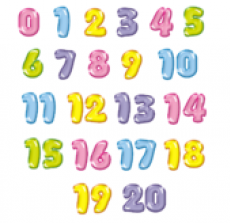
Knowing how to say the numbers in Greek will be very useful to you, especially when you want to buy something. You’ll also need it for when you tell the time, and for hundreds of other reasons - just think of how often you use numbers in your everyday life! So, knowing this will really help you to get by in Greece. Don’t be frightened, though – just because Greece has a different alphabet, it doesn’t mean they have different numbers as well! You don’t have to use Roman numerals or ancient hieroglyphs. When you see numbers written down, they’ll look exactly the same as they do in English, they’re just pronounced differently. Here are the first 20, so you can get an idea of the basics. These are probably the numbers you’ll use the most, so make sure you remember these ones!
0 = μηδέν “me-then”
1 = ένα “ena” (masculine: ένας, feminine: μία, neutral: ένα). We looked at this one before. You’ll most often see it written down the first way, but the ones in brackets are some variations of it you may also see. As in French or Spanish, Greek has both a ‘feminine’ and a ‘masculine’ form, and if you’ve learnt any languages in the past you’ll know what I mean. However, like German, Greek also has a ‘neuter’ or genderless form. Bear this in mind when you read – it’s usually only the endings of the words that change, so you can still work out what the rest of the word is. Anyway, let’s gloss over that for now, and get back to the numbers!
2 = δύο “thio”
3 = τρία “tria” (m: τρεις, f: τρεις, n: τρία)
4 = τέσσερα “tess-era” (m: τέσσερις, f: τέσσερις, n: τέσσερα)
5 = πέντε “pen-day”
6 = έξι “eksy”
7 = επτά “epta” or εφτά “efta”
8 = οκτώ “okto” or οχτώ “ochto”
9 = εννέα “enn-ay-a” or εννιά “enn-ee-a”
10 = δέκα “theka”
11 = έντεκα “en-deka”
12 = δώδεκα “tho-theka”
13 = δεκατρία “theka-tria”
14 = δεκατέσσερα “theka-tessera”
15 = δεκαπέντε “theka-penday”
16 = δεκαέξι “theka-esky” or δεκάξι “thek-a-ksy”
17 = δεκαεπτά “theka-epta” or δεκαεφτά “theka-ef-ta”
18 = δεκαοκτώ “theka-okto” or δεκαοχτώ “theka-och-to”
19 = δεκαεννέα “theka-ennaya” or δεκαεννιά “theka-enni-a”
20 = είκοσι “eh-kosi”
Then, after 20, you say it in the same way you would in English – i.e “twenty one”, “twenty two”, “twenty three”, so in Greek “είκοσι ένα”, “είκοσι δύο”, “είκοσι τρία”. This applies right the way up to 100. In order to get there, let’s see what the rest of the tens are.
30 = τριάντα “trianda”
40 = σαράντα “saranda”
50 = πενήντα “pen-in-da”
60 = εξήντα “exinda”
70 = εβδομήντα “evdo-min-ta”
80 = ογδόντα “oghdonta”
90 = ενενήντα “enen-in-da”
100 = εκατό “ekato”
Knowing how to say the Greek numbers 1 to 100 is easy, once you know these rules. We could go on, but let’s leave it at that for the moment. After all, most of us won’t have to say we’re over 100 years old, or be buying things that are over 100 Euros a piece! Next time, we’ll be looking at some simple interactions in a shop/restaurant environment, so you can put your numerical knowledge to the test.
Image from: http://www.wikihow.com/Sample/Bubble-Numbers

0 Comment:
Be the first one to comment on this article.